Many of our readers have told us that they find large social media platforms exhausting, and for good reason.
There are very few places where people can find niche communities that match their interests without being bombarded by advertisements and dark tactics to get them addicted.
This is a massive opportunity for website owners.
Whether you sell products or services, teach online courses, or run a non-profit, you can easily build a community around your brand. This can help you quickly boost user engagement and loyalty.
In this guide, we will show you how you can create your own private community with WordPress, set it up, and make money from it.
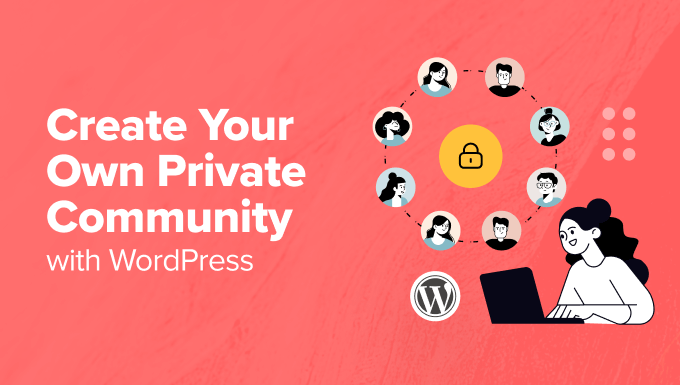
Here is a quick list of topics we will cover in this guide:
- Why Create an Online Community with WordPress?
- Getting Started
- Setting Up BuddyBoss WordPress Community Platform
- Configuring BuddyBoss Settings
- Setting Up a Theme
- Monetize Your Community With Subscriptions And Courses
- Adding Gamification to Boost Community Engagement
- Grow Your Community With a Mobile App
- Growing Your Online Community
Why Create an Online Community with WordPress?
In our experience, creating an online community can significantly enhance user engagement and loyalty.
Over the years, we have learned that highly engaged customers are more likely to purchase and be vocal promoters of your brand.
An online community provides a space for users to interact, share ideas, and participate in discussions, creating a sense of belonging and connection to your brand.
Communities also offer valuable support and feedback. Members can share knowledge, provide insights, and help each other, which can lead to a more vibrant and dynamic environment.
This, in turn, increases retention and can even create new revenue streams through membership fees and exclusive content.
Why Use WordPress?
There are many online platforms for building communities. However, WordPress offers unparalleled freedom and extensibility.
Here are the top reasons to pick WordPress:
- Flexibility: WordPress offers many themes and plugins, allowing you to customize your community to fit your business model.
- Cost-Effective: WordPress is free, needing only investment in hosting and premium features if needed.
- User-Friendly: It is easy to use, even for beginners. This means that you can manage content and settings without any coding knowledge.
- SEO-Friendly: Built with SEO in mind, WordPress plugins like All in One SEO can help you optimize your site for search engines.
New to WordPress? See our detailed WordPress review with pros and cons.
Getting Started
To get started, you will need the following things:
- A domain name
- A web hosting account
- A WordPress community-building plugin
First, you will need to sign up for a web hosting account and register a domain name. Web hosting is where your website lives on the internet, while the domain name is the address that users will type in to visit your online community.
Normally, you can get a domain name for $16/year, and web hosting plans start at $7.99 per month, paid annually.
However, our friends at Bluehost are offering WPBeginner users an exclusive discount and a free domain name.
Basically, you can get started for just $1.99 per month.
Bluehost is one of the largest hosting companies in the world. They are also an officially recommended WordPress hosting provider.
Simply visit the Bluehost website and click on the ‘Get Started Now’ button.

Follow the on-screen instructions to choose a domain name and complete your purchase.
After that, you will be able to log in to your web hosting account dashboard.
Bluehost will automatically install WordPress for you. You can simply click on the ‘Edit’ Site button to log into WordPress admin area.
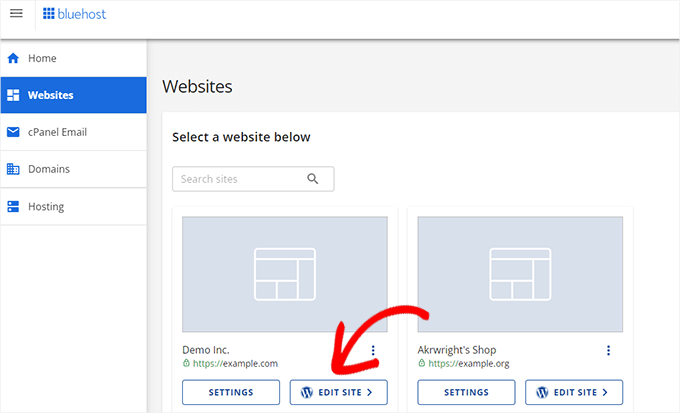
Setting Up BuddyBoss WordPress Community Platform
For this tutorial, we will be using BuddyBoss to create an online community platform with WordPress.
BuddyBoss is the best WordPress community-building platform. It offers all the features you need to build an engaging community, including the ability to:
- Transform your website into a social media platform.
- Add forums, activities, and social groups to your site.
- Allow users to connect and interact with each other.
- Integrate with popular LMS plugins and WordPress membership plugins.
- And more.
For example, here is how an online community built with BuddyBoss could look like:
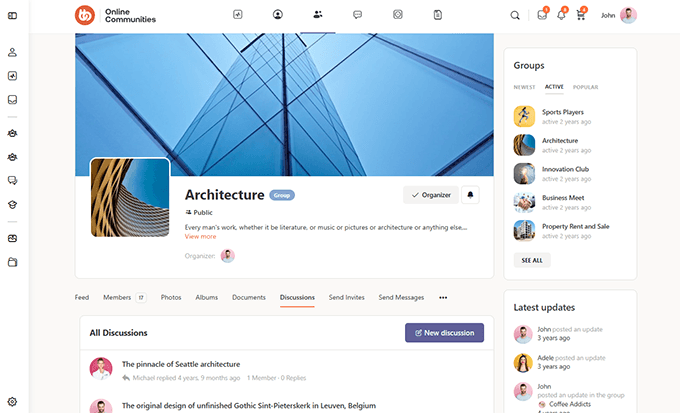
BuddyBoss also offers a free version. However, this free version has limited features, and you will need the paid version, BuddyBoss Pro, to take full advantage of the platform.
To get started, simply visit the BuddyBoss website to sign up.
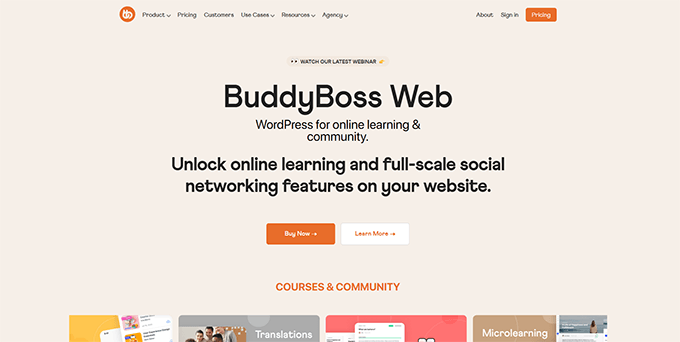
After signing up, you need to download both the BuddyBoss Platform and BuddyBoss Platform Pro plugins on your site. For more details, see our tutorial on how to install a WordPress plugin.
Upon activation, you will need to enter your product license key. You can find this information in your account on the BuddyBoss website.
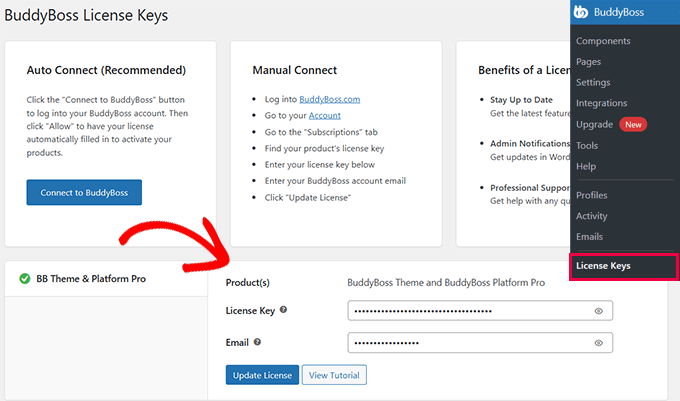
Configuring BuddyBoss Settings
After installation, you need to set up the BuddyBoss plugin to your own requirements.
Activate BuddyBoss Components
BuddyBoss comes with a powerful set of features. Each core feature is called a Component, and you can activate or deactivate it based on your needs.
Simply go to the BuddyBoss » Components page. There, you will see a bunch of components activated by default.
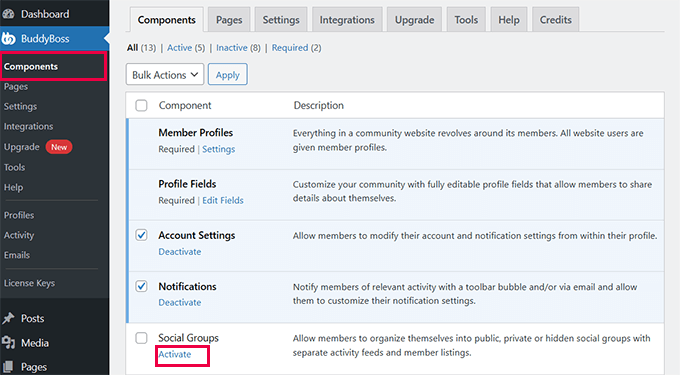
You will need to review the component list and activate any additional components that you want to see on your site.
Here is a list of available components and what they do:
- User Profiles: Allow members to create and customize their profiles.
- Profile Fields: Customize your community with fully editable profile fields.
- Account Settings: Allow members to modify their account and notification settings.
- Notifications: Send notifications to members about relevant activities.
- Social Groups: Enable the creation of social groups where members can join and interact.
- Forums: Set up discussion forums for structured conversations.
- Activity Feeds: Provide activity streams to track and display member activities.
- Media Uploading: Let members upload and share photos, videos, and files.
- Private Messaging: Allow members to send private messages to each other.
- Member Connections: Allow members to make connections with one another.
- Email Invites: Allow members to send email invitations to non-members.
- Moderation: Allow members to block each other and report inappropriate content.
- Network Search: Allow members to search the entire network.
When you activate a component, you may see options to set it up just below the component title.
For instance, under the ‘Profile Fields’ component, you will see the option to Edit Fields.
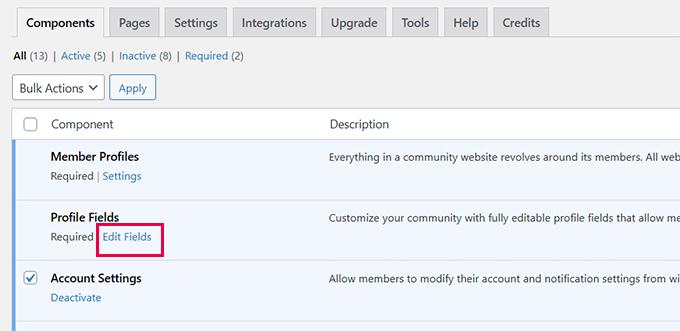
This will take you to the ‘Profiles’ section, where you can add or remove profile fields.
You can also organize your profile fields into Field Sets by clicking on the ‘New Field Set’ button.
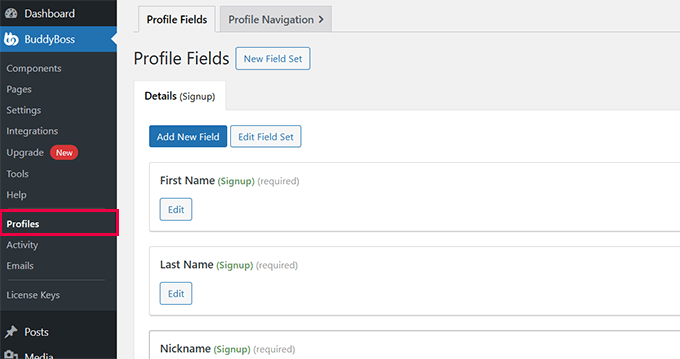
You can then configure components by looking for actions below it or by going through different tabs under the BuddyBoss menu.
Set Up BuddyBoss Pages
Once you have activated the components you need, the next step is to set up pages for different areas of your online community.
Switch to the BuddyBoss » Pages tab, and you can select the pages you want to use for those areas.
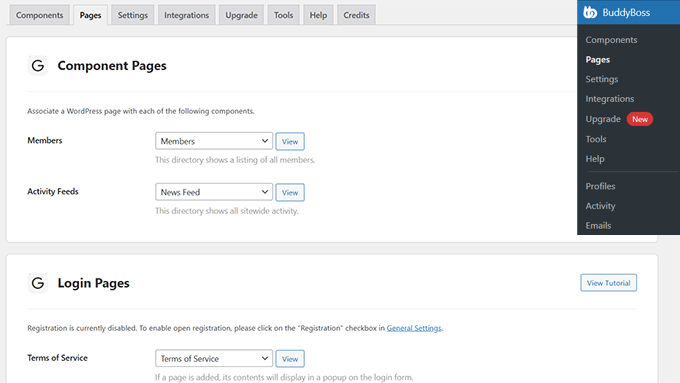
To create a page, simply go to Pages » Add New in the WordPress admin area.
Provide a title for the page and click ‘Publish’ to save it. Then, you can select that page under the plugin settings.
For more details, you can see our tutorial on how to create a page in WordPress.
Setting Up a Theme
In WordPress, themes control how your website looks on the front end to your users.
BuddyBoss is designed to be theme-agnostic, which means it will work with any good WordPress theme.
However, an online community is not like other WordPress business websites. You’ll need to find a theme that allows you to showcase your community and social features properly.
For example, the folks at BuddyBoss also offer a BuddyBoss theme. It is designed to take full advantage of all the plugin features.
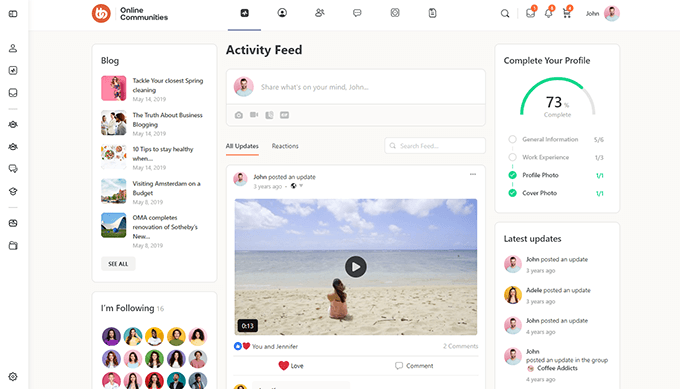
You can find it under your account on the BuddyBoss website. It comes as two separate themes: the main BuddyBoss theme and a child theme.
You will need to install both on your website and then activate the child theme. For details, see our tutorial on how to install a child theme.
The BuddyBoss theme is highly customizable. You can configure all options by visiting the BuddyBoss » Theme Options page.
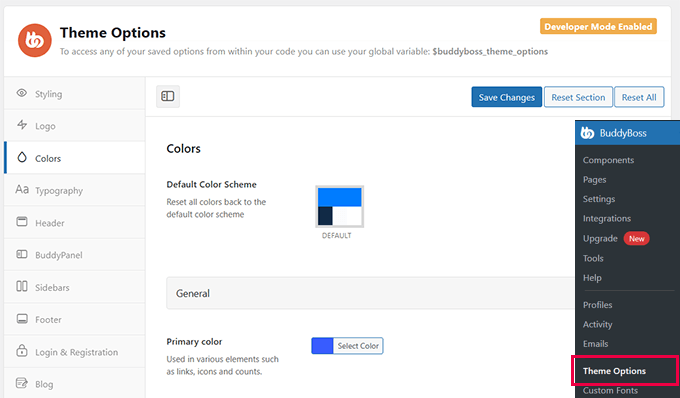
Other Options:
BuddyBoss is based on BuddyPress, which means you can use any of these BuddyPress themes on your site.
Optionally, you can also use any page builder plugin, such as SeedProd, Thrive Architect, and more, to design custom pages for your site.
For more information, see our guide on how to create a custom WordPress theme.
Monetize Your Community With Subscriptions And Courses
BuddyPress allows you to make money from your online community by selling subscriptions, courses, premium content, and more.
It allows you to integrate with any of the top WordPress LMS plugins, including LearnDash, LifterLMS, and more. This allows you to create and make money from online courses on your community website.
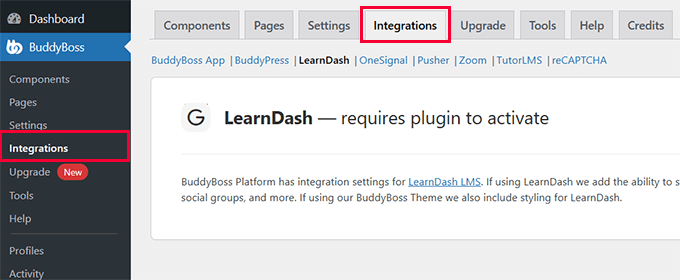
You can also sell subscriptions using any WordPress membership plugin like MemberPress, Thrive Apprentice, and more.
Note: If you are using MemberPress, then you can install their BuddyPress addon to easily integrate with the BuddyBoss platform.
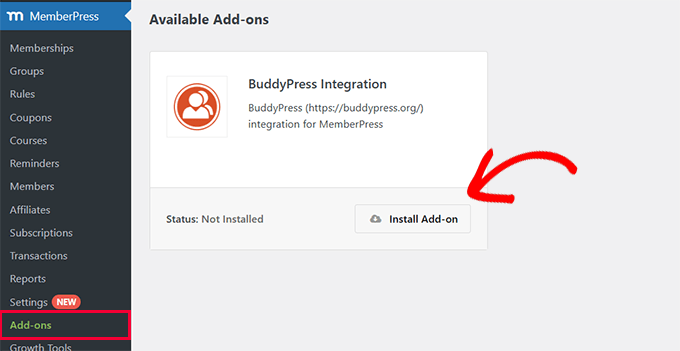
How Does This Monetization Work?
The BuddyBoss integrations let you use a membership plugin to restrict access to members-only content on your website, accept payments, and sell subscription plans.
Similarly, you can use an LMS plugin to create courses and educational materials, manage students, and more.
BuddyBoss adds online community and social media features to boost engagement.
Adding Gamification to Boost Community Engagement
One thing we learned from online games is that they are highly engaging and can help build a community spirit.
Marketers use the exact same game design principles to engage and motivate members to participate and interact more actively online.
BuddyBoss leverages the free GamiPress plugin to gamify your online community by integrating point-based rewards, badges, and achievements.
You will simply have to install and activate the GamiPress plugin on your site.
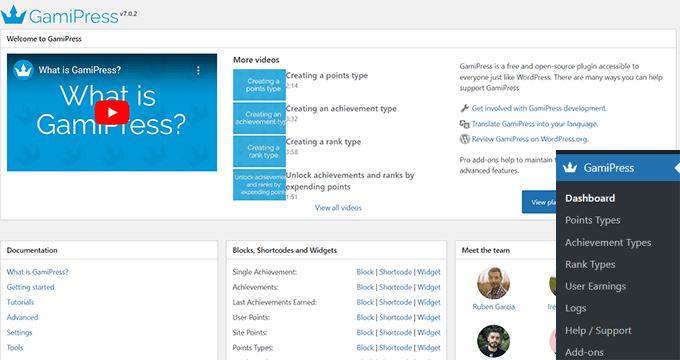
This integration allows community managers to set up various rules for earning points by posting, commenting, or engaging with your community activities.
Members can also unlock badges and achievements for their participation, which enhances motivation and engagement.
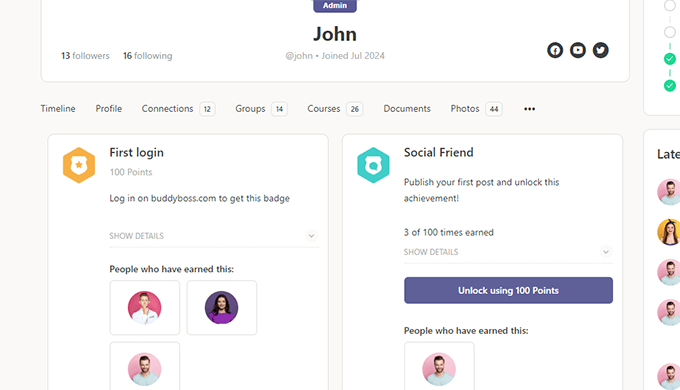
Grow Your Community With a Mobile App
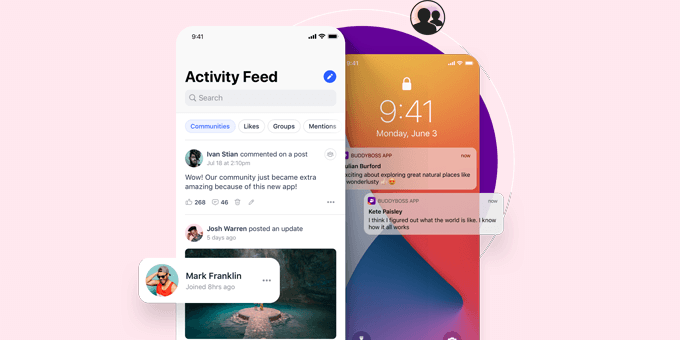
Many users prefer to use social media platforms on their phones using apps.
BuddyBoss offers a mobile app for both iOS and Android (sold separately). The app allows your BuddyBoss community to interact on the go.
Users can access their online courses, post updates, and interact with course creators and other students.
It automatically syncs with your BuddyBoss web platform so that users can access their profiles and courses and interact with other users just like they would on the web.
Growing Your Online Community
Now that you have set up your online community, the next step is to promote and grow it.
Luckily, with WordPress and BuddyBoss, you have access to excellent tools and plugins for growing your business.
Our team tested the best WordPress plugins that work seamlessly with BuddyBoss.
Here are some of those plugins that will help you quickly grow a thriving online community.
- All in One SEO for WordPress – The best WordPress SEO plugin on the market. It allows you to easily optimize your WordPress community for better search rankings and more traffic.
- SeedProd – A beginner-friendly yet powerful drag-and-drop page builder for WordPress. Enables you to easily create professional landing pages for your online community.
- WPForms – The best WordPress form builder plugin, which allows you to easily create on-demand forms and add them anywhere on your site.
- MonsterInsights – Wondering where users spend most of their time in your community? MonsterInsights lets you track website analytics so you can make data-driven decisions to grow your community.
We hope this article helped you learn how to create an online community with WordPress. You may also want to see our guide on how to make $5000 of passive income every month or take a look at these resources on growing an online business on a limited budget.
If you liked this article, then please subscribe to our YouTube Channel for WordPress video tutorials. You can also find us on Twitter and Facebook.
The post How to Create Your Own Private Community with WordPress first appeared on WPBeginner.
